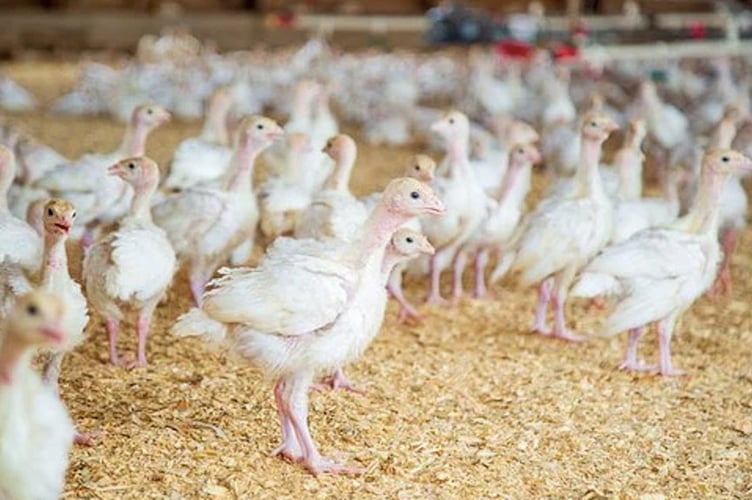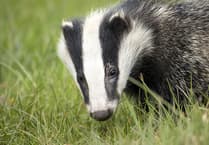Plans for an intensive poultry farm in Ceredigion have raised new concerns over the environmental impact of these chicken factories, with activists saying there are already too many in Powys now, affecting water quality. Chris Betteley and Alexandra Bánfi investigate...
CEREDIGION Green Party has said plans to build a large poultry unit near Talybont – along with others in mid and west Wales – are “cruel”, are “not needed” and “stem from the demand for unsustainably produced cheap food.”
Cllr Chris Simpson has written a strongly worded objection to the plans for a 110,000 chicken farm at Ty Nant submitted again to Ceredigion council in January after it was rejected by planners last year.
In an environmental statement, produced for the proposal, the owners of Ty Nant commented on the proposed development’s capacity to help meet the “rising demand for poultry meat in the UK and becoming self-sufficient in poultry meat”, thus reducing greenhouse gas emissions by not having to import the meat.
But Cllr Simpson said: “It is well recognised that industrial-scale chicken production like this proposed poultry unit causes much more cruelty to the chickens than traditional extensive systems, especially when compared to free-range chicken production.”
Local Green Party president Dorothy Wilson said: “We have seen all the problems with river pollution in Powys where there are several of these enormous units.
“We don’t need one in Ceredigion and we will fight until this proposal is turned down for ever.”
Naomi Salmon, Green Party member in Borth, said: “People need to be able to buy good healthy food that is produced in a way that does not harm the planet.
“This harm includes antibiotic resistant bacteria.
“And then there is the ongoing Avian Flu crisis – again largely attributable to industrial scale poultry farming.
“This unit does nothing to address the underlying inequalities that exist in this country.
“This large poultry unit will never be welcome.”
The original scheme saw 455 objections lodged to the planning department, with thousands signing a petition against the scheme.
Dozens of objections have since been lodged against the new application which is set to be decided by planners later in the year.
Campaign group People for the Ethical Treatment of Animals (PETA) has named Powys County Council “Worst Council in the UK” for approving more than 150 intensive chicken farms in the past five years.
With eight million chickens now being raised in the county’s “mega-farms”, nearby rivers including the Wye are “turning into ‘pea soup’ from all the manure, chemicals, and other muck associated with these facilities”, PETA said in a letter to councillors.
The rebuke from environmental campaigners came as plans for a 100,000 chicken farm in Montgomeryshire were approved by Powys County Council just before Christmas despite local objections.
The plans will see two broiler poultry buildings and the associated infrastructure at their Groes y Garreg farm between Berriew and Castle Caereinion.
The application had been opposed by villagers and a petition asking the proposal to “Cluck Off” which garnered 950 signatures.
In her report Powys County Council planning officer Louise Evans said that the proposal had received 133 objections while there had been 78 messages of support.
Back in October 2019, Berriew community council voted to back the scheme.
Ms Evans said: “It is recognised that there are arguments both for and against the sustainability of intensive livestock units in the UK as well as the overall impact of the development on the environment and local populations.
“All development has an impact, and it is the role of the planning authority to assess whether the impact is acceptable or unacceptable.”
A Powys County Council spokesperson said: “The number of applications being made in Powys reflects the importance of agriculture to the Powys economy and the need for farming businesses to diversify.
“The council has a statutory duty to consider applications that are submitted based on their individual merits. ”
Environmental activists across mid Wales call out IPUs as “disasters” for the environment and the local economy.
Penrhyncoch environmental activist Jeremy Moore lives only a few miles from the proposed Intensive Poultry Unit Talybont and said can’t think of a “worse place to put one”.
“You have to look at the carbon footprint of something like that,” Jeremy said.
“They’re heated and cooled continuously. From what I’ve read, when young chicks are delivered the building is heated to 31 degrees, that temperature is gradually reduced over the life of those chicks. By the time they are ready to leave the temperature is 18 degrees.
“Looking at the carbon footprint again, all the materials, all the chicks will be delivered from who knows where. They’re certainly not brought up locally.
“All the feed, the application said, will come from a feed mill in Oswestry. From what I understand, the feed itself is roughly 50 per cent soya with added wheat.
“Soya is grown on deforested land in South America.
“Once the chicks are grown they will be collected and taken to a processing plant elsewhere.
“The carbon footprint of a place like that is massive. There’s no infrastructure for places like that around here to everything has to be transported.”
Jeremy added: “In the original application they were going to spread the manure on the land. Now in the second application, that’s all changed. It’s all going to be taken to an anaerobic digester in Penparc, 46 miles away.”
Susanna Kenyon, a climate activist from Aberystwyth, also raised concerns regarding the environment, the economy and avian flu.
“We have to look ahead towards an era when we will have to source food locally and grow it sustainably,” Susanna explained.
“Plus IPUs don’t provide local employment beyond the family complex and do put holiday guests off visits. We depend on holiday guests in our local economy.”
Susanna also referred to the spread of avian flu in such intensive environments, suggesting: “We don’t want to cause the next pandemic.”
Vic Bamford, who is part of Extinction Rebellion in Machynlleth, said the pollution from such intensive units is a “disaster”.
She continued: “There are other ways of doing things, there is no need for this to happen. The disaster in Powys is a perfect example.
“The problem with these units are becoming more recognised as their numbers increase. Sustainable food production is within living memory. Demand for cheap chicken is a fast food issue.”
Jeremy also said IPUs are a product of a “cheap and fast culture” that sacrifices the environment.
“In a general sense it’s about short-term profit versus environmental damage,” Jeremy said.
“I’m using the term environmental in a broad sense to include climate, pollution and landscape.
“You can’t blame people for seeing something on the shop shelf, seeing it’s cheaper and buying that one. But it’s at the expense of the land and the environment.
“We keep screwing the last penny out of soil without thinking about the environmental cost – that somebody will have to pay eventually.
“COP26 last November, what’s happened since then? Most of the media has completely forgotten about it. The big questions now are Boris Johnson and his parties and the cost of living. The environment has gone way down the agenda.”
Barry Wise – also a climate activist, said he was really concerned about the trend of permission being given for IPUs.
“Powys is already inundated with these units and approving this application will only open the floodgates for Ceredigion too. This is not ‘animal husbandry’. Indeed, the farmer never actually owns the birds – they are provided and collected by multinationals such as Avara who employ their own workers from outside the area.
“One of the problems is there are almost no planning policies that govern where intensive livestock operations can be sited. The UK Environment Agency classifies these units as industrial but local planning authorities treat them as ‘agricultural’.
“There is a policy void. The repercussions of allowing intensive poultry units to proliferate have been ignored in favour of facilitating the expansion of agribusiness.
“It’s worrying that this proposed huge industrial factory unit at Talybont is being portrayed by some as ‘supporting local farming’.
“This is not farming and does not benefit anyone locally except for the family concerned. The local community will suffer through traffic – at least 800 extra traffic movements a year – pollution, disturbance, noise and smells, serious risk to health and negative impacts on tourism.
“Ceredigion and this valley in particular are known for outstanding natural beauty and strong ‘sense of place’.”

Farming group calls for ‘pause and review’ of IPUs
The Campaign for the Protection of Rural Wales is calling for a moratorium on Intensive Poultry Units until there has been a complete assessment of how they impact the local environment and countryside.
A spokesperson for CPRW told Cambrian News that the moratorium should also include the planned 110,000-check IPU planned for a family farm near Talybont.
“There is a push-pull situation between the Welsh government, Natural Resources Wales and local authorities and those on the environmental side of the equation, and until all of the science about the impact of IPUs on the local environment has been properly assessed, there needs to be a pause and review,” the spokesman said.
He said that part of the issue stems from the fact that the Welsh Government’s farming policy sets out growth from £5 billion in 2014 to £7 billion by 2020, rising to £8.5 billion by 2024, and that intensive farming has been identified as one of those methods to increase food production.
By “push-pull”, the spokesperson said that one on hand, Lesley Griffiths, the Welsh Minister for Rural Affairs said that she would close IPUs if they were shown to be responsible for polluting the River Wye, while her departmental officials were giving funds to farms to promote the development of IPUs.
When it comes to the issue of pollution, CPRW said that it was involved in a full and detailed study with Cardiff University to look at the issues, noting that a lot of the science carried out now is done on a volunteer basis by untrained individuals, which means the data cannot be consider to be “empirical” or unbiased.
The spokesman said that IPUs were just one of many issues facing rural and farming communities across Wales, adding that changing priorities meant that farmers were placed in a difficult position between trying to keep their family farms alive while balancing demands from governments, local authorities, Welsh government agencies such as NRW, and the need to engage in environmentally friendly farming practices.
“Farmers are being squeezed from all sides,” he said.
“That’s why a pause and review on IPUs makes the most sense,” the spokesperson told the Cambrian News, adding that all of the issues needed to be assessed and addressed.
He said the current system was a patchwork of approval and regulating bodies, which wasn’t helping the situation.




